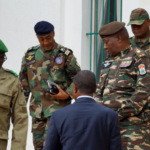The Niger Republic military government has suspended the British Broadcasting Corporation (BBC) and threatened to take the Radio France Internationale (RFI) to court for allegedly “inciting violence and misreporting security-related issues in the country.”
The junta has stopped the BBC from broadcasting its programs on FM stations in the country for the next three months. The RFI operations in the country have also been put on hold pending the expiration of the suspension.
During a national broadcast on Thursday night, Dec. 12, Sidi Mohamed Raliou, Niger’s communications minister, accused the international media of spreading false information with the aim of “destabilising social order and demoralising troops”. The military cabinet, during a meeting on Thursday, has also decided to take RFI to court on charges of inciting communal war and “intent to provoke genocide.”
BBC and RFI had quoted local security and hospital sources in their reportage claiming scores of soldiers and civilians were massacred by a suspected jihadist group of Islamic State in the Sahara. The government has, however, denied the exact location and death toll of the attack reported by the two Western media.
“These rumours claiming that there has been confrontation in Tera which caused the death of 43 soldiers last week, and 91 soldiers later this week as well as 47 civilians are unfounded,” the minister said.
The military authorities have provided a different narrative, claiming that only ten soldiers were killed while 26 terrorists were neutralised during the raid. The ten soldiers were buried in the martyrs’ square (carré des martyrs) of Niamey, they said.
The Niger junta decision means that listeners in the country will no longer be able to listen to the BBC and RFI programs on radio frequencies unless they do so via the internet. The BBC has established its presence in the country since 1994, partnering with independent radio stations that broadcast its programs on the FM band.
It is the first time the Niger government would suspend BBC broadcasting in 30 years. The country’s military rulers have reportedly been hard on journalists and media practitioners exposing its rots. In August 2023, for instance, RFI and France 24 television stations were suspended from broadcasting on charges of inciting unrest.
Niger, Mali, and Burkina Faso have been facing intensifying jihadi attacks, especially from the tri-border connecting the countries in the Sahel region. Jihadi groups operating in Niger include the Al-Qaeda-linked Jama’atu Nusratul Islam Wal Muslminin (JNIM), Boko Haram, and the Islamic State West Africa Province (ISWAP).
Palpable fears have grown about the possible spillover of jihadi operations in Niger and its tendencies to spread across countries like Ghana, Benin, and Côte d’Ivoire, which have been relatively devoid of terrorist attacks.
The military took over power in Niger with heavy promises to eradicate insecurity in the country in no time. But local observers have complained that despite their promises, the rulers have failed to curb the spate of armed violence or stop jihadist attacks.
The military government in Niger has suspended BBC broadcasting and is planning to take legal action against Radio France Internationale (RFI) for allegedly inciting violence and spreading misinformation about security issues. The suspension will last three months and follows accusations from Niger’s communications minister that the media outlets are destabilizing social order and demoralizing troops with false reports.
BBC and RFI had reported that a jihadist group caused significant casualties, which the government disputes, claiming only ten soldiers were killed. This suspension marks the first time in 30 years that BBC broadcasts have been halted in Niger, amid broader issues of press suppression and ongoing jihadi threats in the Sahel region.
Despite the junta’s promises to improve security, local observers note a continued failure to address armed violence and jihadist activities in the region.
